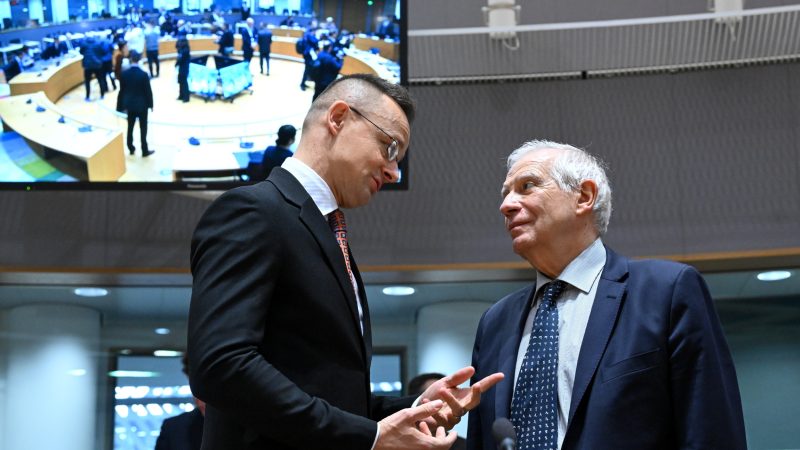- cross-posted to:
- globalnews@lemmy.zip
- news@beehaw.org
- cross-posted to:
- globalnews@lemmy.zip
- news@beehaw.org
- Hungary takes over the rotating EU Council presidency on 1 July
- However, some EU diplomats say Hungary’s ‘veto actions’ might require a discussion about practical changes to the bloc’s decision-making processes
The foreign ministers gathered in Brussels focused on how the bloc could unlock funds from the EU’s off-budget European Peace Facility (EPF).
Hungary has been blocking partial reimbursements for weapons earmarked for Ukraine under the EU’s off-budget European Peace Facility (EPF) for almost a year, with the amount estimated at €6.5 billion – three reimbursement tranches and the new €5 billion-heavy Ukraine Assistance Fund (UAF).
Budapest initially cited Ukraine’s anti-corruption agency for having blacklisted Hungary’s OTP Bank as an “international sponsor of war” as one of the main reasons for their blockage. But while the bank has since then been removed from the blacklist, Hungary has kept the veto in place.
“There is growing frustration (to say the least), as the EU currently sits on €5 billion of support and very soon on the [Russian] windfall profits stemming from immobilised assets, which are at risk of not being used properly if there is no agreement,” one EU diplomat said.
In Monday’s discussion, Budapest was now quoted as saying that its economy is being discriminated against in Ukraine, according to people familiar with the discussions. The new explanation had drawn significant pushback from other EU counterparts, they said.
Inside the room, Germany’s Foreign Minister Annalena Baerbock called on Budapest “to finally allow aid to Ukraine once again, because Europe is only strong if it is united.”
An increasing number of EU member states are starting to point to Hungary’s overall track record, rather than the fact that Budapest has ‘not yet completely vetoed’ any EU decision on Ukraine.
“We looked into this and about 41% of resolutions by the EU on Ukraine have been blocked by Hungary,” Lithuania’s Foreign Minister Gabrelius Landsbergis told reporters.
“The EPF is blocked; Ukraine’s accession talks are being held hostage by Hungary – and I could go on and on – the [EU’s] declaration on Georgia, the EPF [support] to Armenia – basically, almost all of our discussions and needed solutions and decisions (…) are being blocked by just one country,” Landsbergis said.
“We have to start seeing this as a systematic approach towards any efforts by the EU to have any meaningful role in foreign affairs – and we have to start talking about this,” he added.
Echoing the criticism, Belgium’s Foreign Minister Hadja Lahbib, whose country holds the EU’s rotating presidency, told reporters ahead of the talks: “We cannot accept that a single country, which also signed up to this amount a few months ago at the heads of state’s Council meeting, is now blocking this crucial aid for Ukraine.”
Estonia’s Foreign Margus Tsahkna said: “Every time we are coming here, we have to convince Hungary about not blocking very important initiatives.”
“This is crucial now for Ukraine, and also for Europe, to use these EPF funds,” Tsahkna added.
Italy’s Foreign Minister Antonio Tajani told reporters Rome would be “against the blocking. We want to move on.”
Hungary’s Foreign Minister Peter Szijjarto did not answer questions from reporters heading into Monday’s talks.
EU diplomats said they expect the discussion on EU military aid to Ukraine now to shift towards Tuesday’s defence ministers meeting.
Should there be no breakthrough, EU ambassadors “will come together when needed to unlock this very unfortunate situation,” a second EU diplomat said.
Hungary takes over the rotating EU Council presidency on 1 July.
However, some EU diplomats have said they see Hungary’s veto actions as a pattern of behaviour that might require a discussion about practical changes to the bloc’s decision-making processes.
With Monday’s discussion having for the first time addressed the ‘overall picture’ of Hungary’s actions, a growing number of member states would increasingly see this as becoming a serious problem, people familiar with the discussion said.



In places the article seems to imply they hadn’t noticed Hungary was a problem before. It has been, for years, and not just in relation to Ukraine.
Openly buddying up with Russia isn’t exactly new and should have raised red flags. Same with open hostility towards the EU. You can also add China there now too, so it’s not like the problem is just Russia.
Sadly, I don’t see things changing internally. People who support the opposition in Hungary are disillusioned and many of those who could have left. Most, if not all by now, media is owned by either the governing party or affiliates. The electoral system disproportionally rewards whoever gets a plurality, which will be Fidesz with the previous two points.
This has been developing for over a decade. Suggestions that this is something that is only now a problem shouldn’t exist.
Also FFS, Russia has been managing to either control people in power all over the world (see: USA) or put their own people in power. Treat this as proper foreign action.